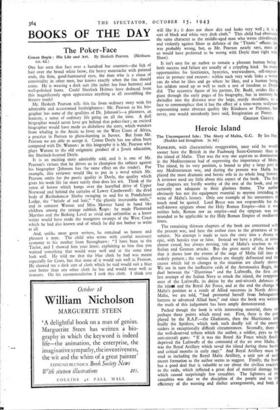BOOKS OF THE DAY
The Poker-Face
ONE has seen that face over a hundred bar counters—the lick of hair over the broad white brow, the heavy moustache with pointed ends, the firm, good-humoured eyes, the man who is a cause of conviviality in other men, but knows exactly when the fun should cease. He is wearing a dark suit (the jacket has four buttons) and well-polished boots. Could Sherlock Holmes have deduced from this magnificently open appearance anything at all resembling the bizarre truth?
Mr. Hesketh Pearson tells this far from ordinary story with his admirable and accustomed forthrightness : Mr. Pearson as his bio- grapher has some of the qualities of Dr. Johnson's—a plainness, an honesty, a sense of ordinary life going on all the time. A dull biographer would never have got behind that poker-face ; an excited biographer would have made us disbelieve the story, which wanders from whaling in the Arctic to fever on the West Coast of Africa, a practice in Portsea to ghost-hunting in Sussex. But from Mr. Pearson we are able to accept it. Conan Doyle has too often been compared with Dr. Watson: in this biography it is Mr. Pearson who plays Watson to the old enigmatic product of a Jesuit education, the Sherlock-hearted Doyle.
It is an exciting story admirably told, and it is one of Mr. Pearson's virtues that he drives us to champion the subject against his biographer (Johnson has The same effect on the reader). For example, this reviewer would like to put in a word which Mr. Pearson omits for the poetic quality in Doyle, the quality which gives his work life far more surely than does his wit. Think of the sense of horror which hangs over the laurelled drive of Upper Norwood and behind the curtains of Lower Camberwell: the dead body of Bartholomew Sholto swinging to and fro in Pondicherri Lodge, the " bristle of red hair," " the ghastly inscrutable smile," and in contrast Watson and Miss .Morstar hand in hand like children among the strange rubbish lteaps: he made Plumstead Marshes and the Barking Level as vivid and unfamiliar as a lesser writer would have made the mangrove swamps of the West Coast which he had also known and of which he did not bother to write at all.
And, unlike most great writers, he remained so honest and pleasant a man. The child who wrote with careful necessary economy to his mother from Stronghurst: "I have been to the Taylor, and I showed him your letter, explaining to him that you wanted something that would wear well and at the same time look well. He told me that the blue cloth he had was meant especially for Coats, but that none of it would suit well as Fresson. He showed me a dark sort of cloth which he said would suit a blue coat better than any other cloth he has and would wear well as trousers. On his recommendation I took this cloth. I think you will like it ; it does not show dirt and looks very well ; it is a sort of black and white very dark cloth." This child had obviously the same character as the middle-aged man who wrote chivalrously and violently against Shaw in defence of the ' Titanic ' officers (he was probably wrong, but, as Mr. Pearson nearly says, most of us would have preferred to be wrong with Doyle than 'right with Shaw).
It isn't easy for an author to remain a pleasant hunian being: both success and failure are usually of a crippling kind. So many opportunities for histrionics, hysterics, waywardness, self-import- ance in posture and excuses: within such very wide links a writer can do what he likes and go where he likes, and a human being has seldom stood up so well to such a test Of freedom as Doyle did. The eccentric figure of his partner, Dr. Budd, strides like a giant through the early pages of his biography, but in memory he dwindles into the distance over the large, sturdy shoulders, to a face so commonplace that it has the effect of a time-worn sculpture representing some abstract quality like Kindness or Patience, but never, one would mistakenly have said, Imagination or Poetry.
GRAHAM GREENE.


























 Previous page
Previous page